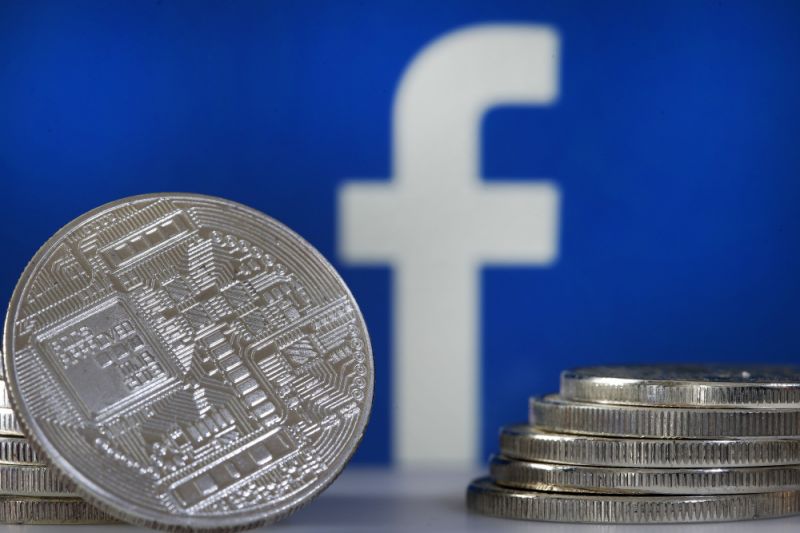(Bloomberg) — Facebook Inc. unveiled plans for a new cryptocurrency called Libra this week. When it launches in 2020 or later, it will be a stablecoin–a digital currency that doesn’t fluctuate much because it’s supported by established government-backed currencies and securities.
The world’s largest social media company published a 12-page white paper on Libra and has more than 20 partners for the project. But there are still many questions. After a week of analysis, here’s what Bloomberg reporters and editors know about Libra, along with key unknowns that remain:
Joe Weisenthal, executive editor: digital news at Bloomberg:
For sure: Libra is being touted as a cryptocurrency, so it’s natural to use existing cryptocurrencies like Bitcoin and Ethereum as mental models for what it could be. But it’s probably better to think instead about traditional peer-to-peer payment networks. Whether you’re talking about PayPal, Venmo, Square, WeChat, or even Western Union, all of these networks are in some way layered on top of the traditional financial system in order to ease some type of transaction (e-commerce, check-splitting, remittances). The problem is that these networks aren’t interoperable, and in many cases the fees can be quite high. Like all these other networks, Libra will be layered on top of the existing financial system, since each coin will be backed by traditional money in the bank to support a stable price. Unlike these other networks, however, there is an opportunity to create payments unification on a global scale, and at potentially a much lower cost. And in theory, anyone will one be able to build payment applications on top of Libra. Some might focus on friends splitting the cost of dinner. Others might be focused on remittance payments to developing markets. In the most extremely successful version of Libra, it’s not so much a cryptocurrency, but a global operating system for moving fiat money around.
Unanswered: There are basically two ways to hold a cryptocurrency. One is you can hold your coins with a custodian, or in a custodial wallet. If you buy your Bitcoin on a site like Coinbase, you can just leave it there, and they’ll hold it for safekeeping. The drawback is that you’re trusting Coinbase, which is a regulated entity. If law enforcement comes after you, and says you’re engaged in some illegal activity, Coinbase can freeze you out of your account and your Bitcoin might as well be gone. The other way to hold Bitcoin is in your own, non-custodial wallet. This entails keeping the cryptographic keys that unlock your coins in your own hands. This could be on your phone, on your computer, on a USB drive, or even on a piece of paper that you keep in a safe deposit box. The drawback is if you lose your keys, then your Bitcoin is gone forever. The advantage is that you have the freedom to do whatever you want with them, and it’s very difficult for law enforcement to do anything about it. The question for Libra is whether a user will be able to hold their coins in a truly non-custodial wallet. Can I keep access to the coins on a piece of paper? Or on a thumb drive? And if so, how will Libra stop someone from transferring that piece of paper to a criminal, or someone in a country that has banking sanctions against it? Facebook says its currency will have mechanisms to defeat illegal activity. But if users can take their keys into their own hands, it’s unclear how Libra will prevent them from being given over to a bad actor. And if Facebook doesn’t have a guaranteed way of preventing this, then will regulators really let it get off the ground?
Kurt Wagner, Bloomberg social-media reporter:
For sure: Facebook is aware that people don’t want to mix their financial data with other personal data, like the information they post to their Facebook profile. So Facebook created a new subsidiary, Calibra, that will build and maintain the company’s digital wallets and work on the Libra cryptocurrency. Facebook’s blockchain boss, David Marcus, says Calibra will store this financial data on separate servers, and won’t share it with Facebook.
Unanswered: Facebook makes almost all of its money from advertising, and it’s unclear how exactly it plans to generate profit from Libra. Under Calibra, Facebook will build new digital wallets into its WhatsApp and Messenger services to make it easier for people to send money to contacts. That could open the door for Facebook to expand into payments and commerce. While messaging apps have been a successful portal for these kinds of activities in Asia, it has been less popular in the U.S., and it’s unclear if people will actually trust a new cryptocurrency invented by Facebook.
Olga Kharif, Bloomberg cryptocurrency reporter:
For sure: Libertarians and crypto geeks have flocked to Bitcoin because it’s not controlled by any government or corporation. Anyone with computers can support the network and help it verify transactions. Libra will be, at least initially, controlled by about 100 organizations–mostly companies. That’s likely to rub crypto diehards the wrong way. It’s even rubbing Bitcoin skeptics the wrong way because they see it as essentially a way for corporations to start minting money. Nouriel Roubini, a professor of economics and international business at New York University Stern School of Business, called Libra “a Monopoly scam.” David Marcus, who heads the Libra project at Facebook, said the network will eventually become distributed, but he hasn’t said when that will happen.
Unanswered: Libra is not necessarily intended to appeal to the crypto faithful, of course; instead, it’s targeting the 1.7 billion unbanked people globally. With Libra, they’ll be able to have something similar to digital bank accounts at companies like Facebook. The problem is, unlike traditional banks, it’s not clear that these accounts will pay interest on deposits. Most other digital wallets for holding crypto don’t pay interest. Facebook emphasized that it doesn’t provide banking services.
Robert Schmidt and Ben Bain, financial regulation reporters at Bloomberg:
For sure: Facebook’s rollout of the Libra coin was close to a disaster in Washington. The negative response in D.C. could threaten its ambitious plan to release the digital tokens by the middle of next year–and reinforces the notion that Silicon Valley companies have no clue how to operate in the nation’s capital. Democrats were quick to lambaste the social media behemoth for jumping into the crypto fray while so many questions still linger about Facebook’s commitment to consumer privacy, its digital market power and the company’s role fueling fake news and Russian-sponsored political attacks in the 2016 election. Republicans were more muted in their response. One thing both sides agreed upon is the need to haul Facebook executives up to Capitol Hill for a public interrogation about Libra. Expect to see them in the next few weeks being sworn in before the Senate Banking and the House Financial Services Committees.
Unanswered: Who will step into the regulatory breach? No single U.S. agency is charged with overseeing cryptocurrencies–a situation that has allowed digital coins to flourish but also made it relatively easy for criminals to use them for laundering money, dealing drugs and ripping off consumers. With the potential of Facebook’s two billion-plus users joining the crypto universe, the government will be forced to confront its laissez-faire policies. Federal supervision of digital money could be streamlined and increased. More than half a dozen regulators have some jurisdiction over cryptocurrency and they will likely vie to take more prominent roles. The Securities and Exchange Commission and the Commodity Futures Trading Commission, because of their expertise monitoring markets, are the leading candidates. Congress, too, could help set new rules. But it would have to pass legislation, an unlikely prospect before the 2020 U.S. elections.
Jenny Surane, Bloomberg finance reporter, and Julie Verhage, Bloomberg’s fintech reporter:
For sure: Facebook needs support from incumbent financial institutions to win consumers’ trust and gain traction in payments. Banks’ initial absence was noticeable, although the project has the backing of the largest payment networks, Visa Inc. and Mastercard Inc. Facebook also hired a slew of former PayPal employees to help with Libra.
Unanswered: How many companies will really work together to make Libra a success? Historically, Visa and Mastercard have been adamant that they only allow fiat currencies on their networks. Banks have also been vocal about the fact that they cannot traffic in cryptocurrencies because of money laundering risks. It’s also unclear if anyone else will join the party. Facebook has said it hopes to have 100 members join the currency’s governing body by next year and the Libra Association is in talks with the largest U.S. banks about teaming up. Citigroup Inc.’s boss said he’d consider it.
–With assistance from Joe Weisenthal, Kurt Wagner, Olga Kharif, Julie Verhage, Jennifer Surane, Robert Schmidt and Benjamin Bain.
To contact the editor responsible for this story: Alistair Barr at [email protected], Anne VanderMey
<p class="canvas-atom canvas-text Mb(1.0em) Mb(0)–sm Mt(0.8em)–sm" type="text" content="For more articles like this, please visit us at bloomberg.com” data-reactid=”64″>For more articles like this, please visit us at bloomberg.com
©2019 Bloomberg L.P.










